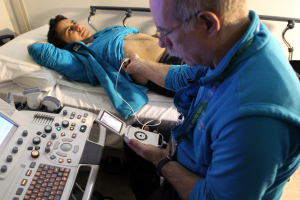by
Brendon Nafziger, DOTmed News Associate Editor | February 25, 2010

Dr. Ross Brown,
an ER radiologist and
manager of the Whistler
Polyclinic, using GE's Vscan
Less than a week after its commercial debut, GE Healthcare's mobile phone-sized ultrasound scanner is helping injured athletes and spectators at the Winter Olympics in Vancouver.
The handheld ultrasound device, called the Vscan, which launched February 15, weighs less than a pound and strongly resembles a flip-up cellphone with a transducer wand attached.
At the 2010 Vancouver Games, it has already seen action. While GE can't discuss specifics of cases because of patient confidentiality, spokesman Arvind Gopalratnam tells DOTmed News it's primarily used for focused abdominal sonogram tests. In the tests, doctors quickly scan the belly after abdominal trauma for evidence of blood pooling before going on to run a follow-up diagnostic exam, Arvind says.



Ad Statistics
Times Displayed: 78115
Times Visited: 2768 Ampronix, a Top Master Distributor for Sony Medical, provides Sales, Service & Exchanges for Sony Surgical Displays, Printers, & More. Rely on Us for Expert Support Tailored to Your Needs. Email info@ampronix.com or Call 949-273-8000 for Premier Pricing.
Currently, about three units are at the Games, spread out among the Vancouver Polyclinic and the Whistler Polyclinic's mobile medical unit, all set up to tend to the Olympics' athletes and visitors.
According to Gopalratnam, the Vscan is actually only one of about 30 GE technologies operating at the Games.
"We have a very close relationship with the medical staff at the Vancouver Polyclinic," he says.
Other GE equipment there include MRI and CT scanners, as well as state-of-the image processing and sharing software.
A former GE Healthcare Canada executive actually helped arrange the cooperation of GE, an Olympic sponsor, to outfit the polyclinics, sprawling, 10,000 square-foot temporary hospitals erected in Vancouver and at the outskirts of the Olympic Village on the slopes of Whistler.
And for the athletes, it's a good thing. The Games have already witnessed several high-profile injuries, such as U.S. downhill skier Stacey Cook's crash during training on February 11.
"At the Winter Games you see significantly more injuries than the at the Summer Games," Gopalratnam observes, "[because of] the nature of the sports and competitions that go on."

